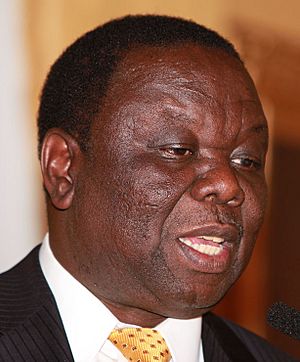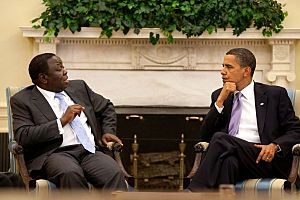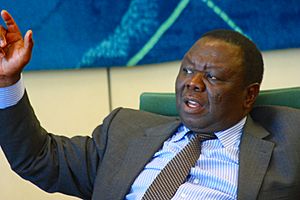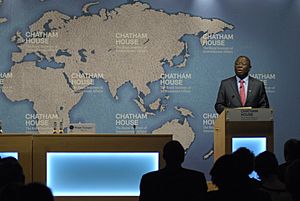Morgan Tsvangirai facts for kids
Quick facts for kids
Morgan Tsvangirai
|
|
|---|---|

Tsvangirai in 2009
|
|
| 2nd Prime Minister of Zimbabwe | |
| In office 11 February 2009 – 11 September 2013 |
|
| President | Robert Mugabe |
| Deputy | Thokozani Khuphe Arthur Mutambara |
| Preceded by | Robert Mugabe (1987) |
| Succeeded by | Office abolished |
| President of the Movement for Democratic Change – Tsvangirai Movement for Democratic Change (1999–2005) |
|
| In office 30 September 1999 – 14 February 2018 |
|
| Preceded by | Gibson Sibanda |
| Succeeded by | Nelson Chamisa |
| Leader of the Opposition | |
| In office 30 September 1999 – 14 February 2018 |
|
| President | Robert Mugabe Emmerson Mnangagwa |
| Preceded by | Abel Muzorewa |
| Succeeded by | Nelson Chamisa |
| General Secretary of the Zimbabwe Congress of Trade Unions | |
| In office 10 May 1987 – 30 September 1999 |
|
| Preceded by | Masotsha Ndhlovu |
| Succeeded by | Wellington Chibebe |
| Personal details | |
| Born |
Morgan Richard Tsvangirai
10 March 1952 Gutu, Southern Rhodesia |
| Died | 14 February 2018 (aged 65) Johannesburg, South Africa |
| Cause of death | Colorectal cancer |
| Political party | Zimbabwe African National Union (before 1987) Zimbabwe African National Union – Patriotic Front (1987–1999) Movement for Democratic Change (1999–2005) Movement for Democratic Change – Tsvangirai (2005–2018) |
| Spouses |
Susan Mhundwa
(m. 1978; died 2009)Elizabeth Macheka
(m. 2011) |
| Children | 9 |
| Signature |  |
| Website | |
Morgan Richard Tsvangirai (born 10 March 1952 – died 14 February 2018) was an important Zimbabwean politician. He served as the Prime Minister of Zimbabwe from 2009 to 2013.
Tsvangirai was the leader of the Movement for Democratic Change (MDC) party. Later, he led the Movement for Democratic Change – Tsvangirai (MDC–T). He was a key figure who stood against former President Robert Mugabe.
In the 2002 presidential election, Tsvangirai ran against Mugabe but lost. He believed the election results were unfair. He also ran in the first round of the 2008 presidential election. Official results showed he won 47.8% of the votes, more than Mugabe's 43.2%. Tsvangirai said he had won outright and that the results might have been changed.
He planned to run in the second round against Mugabe. However, he pulled out because he felt the election would not be fair. He said there was widespread violence and unfairness from government supporters.
On 6 March 2009, Tsvangirai was in a car crash. He got some injuries, but they were not life-threatening. Sadly, his first wife, Susan Tsvangirai, died in the accident.
During the 2017 Zimbabwean coup d'état, Tsvangirai asked Mugabe to step down. He hoped for a meeting of all groups to plan Zimbabwe's future. He also wanted international help for fair elections. This, he believed, would lead to a proper government.
Morgan Tsvangirai passed away on 14 February 2018, at the age of 65. He had been suffering from colorectal cancer.
Contents
- Early Life and Family Background
- Starting in Politics
- Leading the Movement for Democratic Change
- Facing Arrests and Challenges
- Accusations Against Tsvangirai
- International Meetings
- The 2008 Election
- Political Discussions and Agreements
- Working in the Unity Government
- Awards and Recognition
- Death
- See also
- Images for kids
Early Life and Family Background
Morgan Tsvangirai was born in the Buhera area of what was then Southern Rhodesia. His parents were from the Karanga Shona group. He was the oldest of nine children. His father worked as a communal farmer, mine worker, carpenter, and bricklayer.
He went to primary schools in Hwedza, Gutu, and Silveira. He finished his secondary education at Gokomere High School. In April 1972, after school, he started his first job as a trainee weaver in Mutare. In 1974, he became an apprentice at Bindura's Nickel Mine in Mashonaland Central. He worked there for ten years, moving up from plant operator to plant supervisor. His family home was in Buhera, about 220 km south-east of Harare.
Tsvangirai married his first wife, Susan, in 1978. They had six children together. Their marriage lasted 31 years until her death in the 2009 car crash. He married his second wife, Elizabeth Macheka, on 15 September 2012. She had three children.
Starting in Politics
After Zimbabwean independence in 1980, Tsvangirai, who was 28, joined the ZANU–PF party. This party was led by Robert Mugabe, who would later become his main political opponent. Tsvangirai was a strong supporter of Mugabe early on. He quickly rose through the party ranks.
He also played a big part in the Zimbabwean trade union movement. He became the branch chairman of the Associated Mine Workers' Union. Later, he was elected to the executive of the National Mine Workers' Union. In 1989, he became the Secretary-General of the Zimbabwe Congress of Trade Unions (ZCTU). This was the main trade union group in Zimbabwe.
Tsvangirai led the ZCTU to become independent from the ruling ZANU-PF party. As his influence grew, his relationship with the government became difficult.
Speaking Out Against Unfairness
In 1983, Robert Mugabe ordered a military unit called the 5th Brigade to act in Matabeleland. This unit was trained by North Korea. Tsvangirai later used this event, known as Gukurahundi, to gain support against ZANU. He visited the mass graves of victims in areas like Tsholotsho and Kezi.
Working for a New Constitution
The National Constitutional Assembly (NCA) was formed in 1997. Tsvangirai led its daily operations. The NCA brought together many Zimbabwean citizens and groups. These included workers' unions, student groups, women's groups, churches, and human rights groups.
They formed the NCA to push for changes to the country's constitution. They believed that Zimbabwe's problems came from the old Lancaster House constitution. They wanted a new, democratic constitution. Tsvangirai stepped down from the NCA after he was elected president of the MDC.
Award for His Work
In 2001, Tsvangirai received the Solidar Silver Rose Award. This award is given for great achievements in civil society. It honors those who work to create a fairer and more just society.
Leading the Movement for Democratic Change
In 1999, Tsvangirai helped create the Movement for Democratic Change (MDC). This was an opposition party that stood against President Robert Mugabe and the ZANU-PF ruling party.
He played a big role in defeating the February 2000 constitutional referendum. He successfully campaigned against it along with the National Constitutional Assembly.
Tsvangirai lost the March 2002 presidential election to Mugabe. Many people claimed that Mugabe had unfairly won the election. They pointed to violence, unfair media coverage, and problems with voter lists.
Facing Arrests and Challenges
Tsvangirai was arrested after the 2000 elections and accused of treason. This charge was later dropped. In 2004, he was found not guilty of treason. This charge was about an alleged plan to harm Mugabe before the 2002 presidential elections. George Bizos, a famous South African human rights lawyer, helped defend Tsvangirai.
Arrest in October 2000
Tsvangirai was arrested after the government said he threatened President Robert Mugabe. He had told supporters that if Mugabe did not step down peacefully, "we will remove you violently." However, Tsvangirai said he was warning Mugabe to learn from history. He said, "There is a long line of dictators who have refused to go peacefully – and the people have removed them violently." The courts later dismissed these charges.
Arrest in June 2003
In May 2003, Tsvangirai was arrested again. This happened shortly after he gave a press conference. The government claimed he had encouraged violence.
Arrest and Beating in March 2007
On 11 March 2007, the day after his 55th birthday, Tsvangirai was arrested. He was on his way to a prayer meeting in Highfield.
He was reportedly badly treated by a special army unit after his arrest. This happened while he was held at Machipisa Police Station. There were many reports of opposition activists and their families being attacked by government-supported groups.
Raid at MDC Headquarters
Tsvangirai was released, but on 28 March 2007, Zimbabwean police raided the MDC headquarters. They arrested him again. This happened just hours before he was supposed to talk to the media about recent political violence.
Tsvangirai's Bodyguard Dies
On 25 October 2007, it was reported that Nhamo Musekiwa had died. He had been Morgan Tsvangirai's bodyguard since 1999. His death was due to injuries he got in March 2007 during a government crackdown. The MDC spokesman Nelson Chamisa said Musekiwa had been severely beaten by the police. During that time, police stopped a prayer meeting, and one MDC activist, Gift Tandare, was shot and killed.
Safety Concerns Delay Return
Tsvangirai was supposed to return to Harare, Zimbabwe, on 17 May 2008. However, his party said he stayed in Europe because they found out about a plan to harm him.
Arrest in June 2008
Morgan Tsvangirai was stopped by police while campaigning on 4 June 2008. He and 14 party officials were held at a police station in Lupane. Tsvangirai and human rights groups believed this was a way to stop his campaign for the elections. Police said he was threatening public safety by holding a meeting without permission. He was released after eight hours without any charges. Tsvangirai called it "nothing but the usual harassment."
On 6 June 2008, he was stopped again at a police checkpoint. He was prevented from attending a pre-election rally near Bulawayo. Police said they should have been told in advance about his visit.
Accusations Against Tsvangirai
Accusations of Plotting Against the Government
In 2003, Ari Ben-Menashe accused Tsvangirai of planning to overthrow the Zimbabwean government. After a trial for treason, Tsvangirai was found not guilty of these charges.
Investigations Over WikiLeaks
In 2011, the Attorney General looked into whether Tsvangirai could be charged with conspiracy or treason. This was after information from WikiLeaks was published.
Disagreements Within His Party
Tsvangirai was accused of allowing some activists to treat opponents unfairly within his own party. In 2005, these accusations led to a split in his party.
In February 2014, a senior party member claimed he was hurt after asking Tsvangirai to step down as party leader. Tsvangirai said his party would investigate the claim.
International Meetings
Meeting with John Howard
In August 2007, Tsvangirai met Australian Prime Minister John Howard in Melbourne. After their talks, Tsvangirai told the media that countries like Australia could help in the fight against President Robert Mugabe's government.
Meeting with Thabo Mbeki
In September 2007, Tsvangirai met Thabo Mbeki, the former President of South Africa. They had important talks about speeding up discussions between the ruling ZANU PF and the Movement for Democratic Change party.
Meeting with Raila Odinga
In May 2008, Tsvangirai met Raila Odinga, who was then the Prime Minister of Kenya. Odinga encouraged him to run in an election run-off against Mugabe.
The 2008 Election
A presidential election and parliamentary election took place on 29 March 2008. The three main candidates were Mugabe, Tsvangirai, and Simba Makoni.
The official results for the first round of the presidential election were released on 2 May 2008. The MDC strongly disagreed with these results. According to the Zimbabwe Electoral Commission, Tsvangirai won the first round with 47.9% of the votes. Mugabe received 43.2%. This meant that no candidate had more than 50% of the votes, so a second round (run-off) was needed. MDC spokesman Nelson Chamisa called the results "scandalous daylight robbery." The MDC continued to say that they had won outright with 50.3% of the votes.
Tsvangirai, who was mostly in South Africa after the first round, announced on 10 May that he would take part in the run-off with Mugabe. He said the second round should happen within three weeks. He also said he would only participate if there was "unfettered access of all international observers," a new Electoral Commission, and free access for the media.
On 22 June 2008, Tsvangirai announced that he was pulling out of the run-off election. He called it a "violent sham." He said his supporters risked being killed if they voted for him. He promised that the MDC would eventually win. Soon after this announcement, Mr Tsvangirai went to the Dutch Embassy in Harare for safety reasons.
Political Discussions and Agreements
On 22 July 2008, Tsvangirai and Mutambara met Mugabe in Harare. They shook hands for the first time in over ten years. These talks were arranged by Thabo Mbeki. The goal was to settle election disputes and share power between the MDC and ZANU-PF.
After four days of talks, Thabo Mbeki, the South African President and mediator, announced an agreement. Mugabe of Zanu-PF, Arthur Mutambara of MDC, and Tsvangirai signed a "memorandum of understanding" to share power. In this historic deal, Mugabe agreed to give up daily control of the government.
On 15 September 2008, leaders from the 14-member Southern African Development Community watched the signing of the power-sharing agreement. This deal was put together by Thabo Mbeki. With handshakes and smiles, Mugabe and Tsvangirai signed the deal to end the political crisis. Mugabe remained president, Tsvangirai became prime minister, and Mutambara became deputy prime minister. The MDC took control of the police, while Mugabe's ZANU-PF kept command of the Army.
In January 2009, Tsvangirai announced he would join a coalition government as prime minister with Mugabe. This was after leaders across Africa insisted on it. On 11 February 2009, Tsvangirai was sworn in as the Prime Minister of Zimbabwe.
Working in the Unity Government
After the unity government started, Tsvangirai's choice for deputy agriculture minister, Roy Bennett, was arrested. He was accused of trying to destabilize the government. Tsvangirai's government had little power to stop these charges. Also, land invasions by war veterans continued, and Mugabe kept his land reform policy despite protests from the opposition.
Tsvangirai reportedly visited Nigerian pastor T.B. Joshua in September 2010. He sought spiritual help for the upcoming Zimbabwean elections.
In early 2012, Tsvangirai said that the original power-sharing agreement was not being followed. He stated that Mugabe had made many decisions without consulting him. This included appointing governors and ambassadors.
The unity government ended with the 2013 Zimbabwean general election. In this election, Mugabe was re-elected as president. The role of Prime Minister was removed from the Constitution in 2013.
Awards and Recognition
In May 2010, Tsvangirai visited South Korea. He received an honorary degree of Doctor of Laws from Pai Chai University. He was the 13th person to receive an honorary degree from this university.
Death
In June 2016, Tsvangirai announced that he had been diagnosed with cancer and was getting treatment. Over the next few years, his health got worse. On 6 February 2018, it was announced that he was very ill in a hospital in South Africa. An MDC spokesperson said, "We should brace for the worst," meaning his condition was very serious. He died eight days later, on 14 February. His death was announced by Elias Mudzuri, a senior official in his party. Tsvangirai's death was seen as a big loss for the MDC. This was especially true as elections were planned for mid-2018, the first since Robert Mugabe's rule ended.
The cause of his death was believed to be colorectal cancer.
See also
 In Spanish: Morgan Tsvangirai para niños
In Spanish: Morgan Tsvangirai para niños
- History of Zimbabwe
- Years in Zimbabwe
- Premiership of Morgan Tsvangirai
Images for kids
 | Sharif Bey |
 | Hale Woodruff |
 | Richmond Barthé |
 | Purvis Young |





